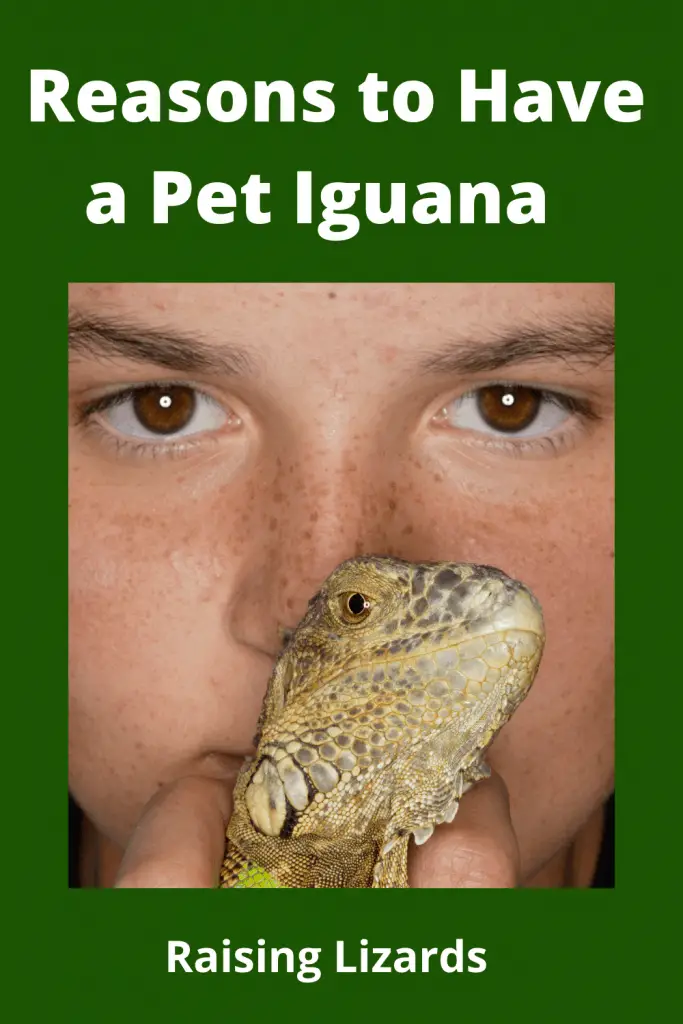- Easy to Acquire
- Long Lifespan
- Price is Reasonable $20 – $50
- They Grow Quickly
- Very Hearty
- Generally Healthy / With Proper Diet
- Strict Vegetarians
Reasons to Have a Pet Iguana
Reasons to Have a Pet Iguana. Iguanas are the native of South and Central America. Also, Iguanas are one of the most popular pet lizards. However, they require a high level of care and essential commitment from the owner. Iguana has intense feeding and housing needs that can increase as they grow up.
They are enormous and robust as compared to other lizards(Anoles, Geckos, etc.). They can be challenging to deal with and can be aggressive and furious if not appropriately handled. This does not mean that the iguanas cannot make good pets, but it does need an owner who understands this commitment from the beginning.

Reasons to Have a Pet Iguana / Basic Characteristics
Size of Mature Iguana: Up to 22 pounds and up to 7.2 feet long
Age: 11 to 13 years in captivity, though up to 20 years is not uncommon
Scientific Name: Iguana iguana
Common Names: Iguana, American Iguana, Green Iguana.
Iguana Behavior and Temperament:
Pet Iguanas will try to escape from their homes/enclosures due to their wild nature and inheritance. Pet iguanas need to be picked up and held as usual for taming purposes so that they learn to trust you.
This also leads Iguanas to become comfortable with their environment. However, this is very difficult because they often find human contact unnatural and may oppose it. Therefore, you must handle your captive Iguana with care and patience.
Baby Iguanas can move fast, but only at a young age. But, adult Iguanas are often very slow and lazy when they do not feel threatened. When out of their Cage, iguanas agonists prefer to climb on their owners. They have sharp claws, so wear protective clothing if your pet likes this activity.
Also, Iguana can do real damage with its tail. Their tail is powerful. The tail of an adult Iguana breaks a human bone. Although it’s relatively rare, iguanas are still powerful creatures. So pay attention to any struggles or aggression when handling them, especially if children or other pets are also present.

Iguana Cages
When included in the tails’ measurement, the iguanas can grow up to 7.2 feet long and usually weigh 22 pounds. This size often surprises new owners who start with small children. Therefore, an aquarium or a small enclosure is only useful when iguanas are young.
Most commercially available cages do not meet the needs of the Iguana space. Many Iguana owners choose custom-built enclosures accompanied by many shelves, ramps, and branches on which these iguana species can climb. A suitable enclosure for a single Iguana is approximately 8 feet tall, 6 feet wide, and 12 feet long. Many pet owners even choose to convert an entire room or a large room into their Iguana housing.
To keep your Iguana enclosure clean, remove feces, shedded skin, uneaten food, and other visible debris daily. Also, clean food and water containers daily. Once a week, transfer your Iguana to a temporary cage to clear its primary enclosure.
Remove the substrate (bedding that absorbs debris and dirt), and clean all surfaces and decorations, e.g., rocks, tree branches, etc., with a pet-safe cleaner. Wait for everything to dry thoroughly before reassembling the Cage.
Heat Range for Keeping Pet Iguana
Iguana is a tropical animal. He wants to bask at 95-96 degrees Fahrenheit, and his home should not fall below 75-76 degrees Fahrenheit. Iguana needs a temperature of around 84 to 85 degrees Fahrenheit to digest her food properly. It should be closely monitored, especially if you are adjusting the whole room climate for its residence.
The heat lamp you use to get the maximum temperature is typically located less than a foot away from the basking ledges (follow the instructions on your specific light) to obtain optimal temperature.
Light Needed for Optimum Health of Your Iguana
A giant enclosure means a lot of light. Use a UVB bulb designed to provide your beautiful Iguana with adequate light exposure for 11 to 12 hours daily. It mimics natural sunlight’s benefits, increasing vitamin D production. Mercury vapor bulbs can be used for large cages or rooms, while compact fluorescent tubes or lights can work for small enclosures.
Iguana’s Need Moisture or Humidity
Pet Iguanas need at least 70-72% humidity in their environment. You can increase your Iguana surroundings’ moisture by adding a dish of water to the Cage or using a mister/fogger to increase humidity. To maintain healthy skin, generally, mist your Iguanas twice a day.
Substrate for Iguana Cage
The wood substrate, or bedding, is usually sufficient. Because they are a species that lives in trees, they spend most of their time climbing instead of sitting in their bedding.
Food and water for your Iguana
Fresh and variety of food are the key to healthy Iguana. Iguanas are herbivores in the wild. They avoid animal protein, including insects. A high-protein diet can lead to health problems, such as kidney failure, in Iguana.
In addition to a standard pelleted commercial diet, provide your Iguana with some fruits, deep leafy greens, and a calcium supplement. Also, Iguana needs fresh water available at all times. Follow your Vet-Doc’s instructions on how much you have to feed your pet to maintain a healthy weight for your pet.

It is important to remember that Iguana swallows its whole food without chewing it, so everything you offer should be shredded or cut into small pieces. Remove and discard any food that has not been eaten within 24 hours.
Precautions Handling Iguana’s
Follow common-sense hygiene practices when handling them. Wash your hands thoroughly before and after spending time with your pet, and avoid touching your face. In most cases, the spread of the disease must be stopped. However, if you have young children, the elderly, pregnant women, or people with compromised immune systems in your home, take extra precautions. Diseased or carrier Iguana may not be the right pet for your family.
Male vs. Female Iguana:
It is unnecessary to know the sex of your pet’s Iguana. It also undoubtedly help design a way to care for your pet. Knowing the gender of your Iguana will allow you to provide better, gender-related care for your pet, as well as prevent the birth of an unwanted breed if you have multiple iguanas.
Vet-Doc:
Your veterinarian can examine the cloacal vent and tell you about the Iguana’s sex. Your veterinarian will be the best person to accurately determine the sex of your Iguana, especially if you have a young Iguana. Juveniles are significantly more challenging to have sex properly. If your Iguana is less than a year old, a veterinarian will be the only person who can accurately determine the sex of your pet.
Male Appearance
Adult males are significantly larger than adult females. As well as bumps are present at the top of a male’s head, and long spikes are current on the back going down to their tail. Males are also more likely to have a larger dewlap under the chin and muscles next to their jaws. Male iguanas also have femoral pores inside their legs.
Female’s Appearance
Female Iguanas have longer and thinner bodies than their male counterparts. Their heads are also small and do not have bumps on top of their heads. The female iguanas only lay eggs.
If you see that your Iguana has laid eggs, you can know that you are the female Iguana owner. The female will produce eggs regardless of whether they have had sexual intercourse with a male or not. In the breeding season, the female looks thinner in the legs and tail with a bulging belly.
Behavior in Breeding Season
During the breeding season, you may notice changes in gender-dependent behavior in your Iguana. Males are known to be significantly more aggressive.
They can behave regionally and even show physically threatening behaviors, including biting and attacking. Some males also change to orange during the growing season. Females may be less likely to eat or stop eating during the breeding season. Females can also exhibit digging behavior or try to build a nest.
General Health and Behavioral Problems
Like most pet reptiles, Iguana contains Salmonella. This means that Salmonella is present in the digestive system of Iguana without causing disease in animals. But humans can get it by touching Iguana or objects in their environment.
A common health problem in Iguana is kidney disease, often due to dehydration. If your Iguana is lethargic, swelling is present on his/her body drinking or urinating frequently, see a Vet-Doc immediately.
Also, Iguanas often suffer from the metabolic bone disease (MBD) due to insufficient calcium and vitamin D, so calcium supplementation and UVB lighting are essential. Also, many Iguanas come down with respiratory illnesses in cold habitats.
In terms of behavior, most Iguana can be overcome with proper daily handling. They prefer a predictable routine, which makes them feel safe. However, they have a strong sense of self-defense and will scratch, cut, and whip their tails if they feel threatened.

Choosing Your Iguana
Iguana is readily available from breeders, pet stores, and rescue groups. Many Iguana owners have to leave iguanas in shelter or rescue homes when they realize that they cannot meet their unique needs. They are often available for purchase from 30 to 60 USD.
Don’t be fooled by a pet store that sells you a small Iguana and claims that it will stay that way. These animals grow very fast. Find an Iguana who is active with clear eyes, healthy skin, and a bright regular face. Red flags include low weight, mucus around the animal’s nose or mouth, spots or sores on its skin, and lethargy.
Finally, check with your local laws or consult a veterinarian to verify the legality of keeping pets in your area. It would help if you also made sure that a Vet-Doc near you accepts Iguana as a patient.
Are you thinking of adopting your pet green Iguana? It is amazing. If you are ready for this, and you have all the proper resources to prepare for the life of a reptile parent. Then go for it as soon as possible.
Unfortunately, green Iguana is often misrepresented in popular pet stores, and many potential pet Iguana keepers have no idea what they are up to. As the old saying goes, great Iguana comes with great responsibility, and it is essential to understand the requirements and implications of Iguana’s ownership entirely.
Factors in Keeping a Pet Iguana
1. They Grow Quickly
The iguanas at the pet store display are usually small and cute, usually the size of a regular cell phone, but it doesn’t last forever. It may grow up to a tablet within days. And in just a few months, it may acquire the size of a giant monster of 7 feet approximately.
A healthy green iguana can be longer than 7 feet in length and weigh up to 22 pounds (equal to an alligator) in captivity. Please think twice before housing iguanas. This cute little green lizard won’t be gecko-sized for long, and when he’s fully grown, he looks like Godzilla, which is cool until you realize that Godzilla is famous for destroying Tokyo.
2. They Need a Lot of Space
Well, they grew up, so what? Maybe you have enough room in your home, or perhaps you want to live in an apartment with Iguana. You hate it, but it’s a fact that adult iguanas take up more space than you think, and they need to have their dedicated area to move around freely.
Iguanas are also arboreal, so they will need heights to fulfill their natural desire to climb. The pet store Terrarium works well for babies, but they will grow out of it within a year. This means you need to create a safer enclosure for your adult iguana, which must be longer than their length (We have discussed the above Housing section). A small room is even better unless it is appropriately modified.
Other ideas: A dedicated space for the sun might work well, and in some weird cases, a heavily modified and redesigned bathroom may be a good option.
3. They are Native to the Tropics:
The green iguanas you find at pet stores are usually imported from South or Central America, and they are from areas that are rich in heat and moisture. But besides everything, it is a fact that the iguanas in captivity have to live in a similar environment, and their Cage needs to be made of natural habitat.
This means that you need to ensure that their environment is continuously warm, between 85 and 95 degrees during the day and about 75-78 degrees at night. They retain most of their hydration through the skin, so controlling moisture is also very important.

4. They are Hearty Pets
This is not the most pleasant thought, but if threatened, Iguanas can do some severe damage to their defense system, i.e., their tails. They move around quickly and move on or dangle around you, but don’t be fooled:
Getting hit by Iguana’s tail is not fun for anyone, and you will receive whipping of tail more often in taming months if you do not have a good bond with your Iguana or you disturb him by any means.
In extreme cases, the adult iguana tail is strong enough to break a human bone. The devastating and deadly consequences come when you throw a human child or other small pet into the Iguana’s territory.
But if you want to feel the wrath of Iguana, you’ll have to do something extraordinary stupid with your dear green friend to get hit by its tail. Iguanas have a wild line of inheritance, so they prefer their own will and do what they want. Their teeth are also sharp, and you must avoid the Iguana bite, but the physical wounds are nothing compared to what they do in reality.
5. They are Not for Cuddling:
Although their tiny bodies and screams let us think that they are saying, “cuddle me, man.” But in reality, it’s the opposite. They are not dogs or cats. They are wild reptiles with territorial regions. So, avoid cuddling them because it is not in their nature.
This does not mean that communication is forbidden. In contrast, domestic iguanas need to be picked up and held daily for ritualistic taming purposes. Although holding or handling the Iguana correctly is an art, it will take some time to master that art.
Some Iguana may also be interested in climbing on their human owners, although digging in the skin with their sharp claws is not the most pleasant thing. Most Iguanas try to get away from you, and if you are not listening to the wisdom of its reptilian mind, you may get hurt by its sharp claws or tail.
6. They Shed Their Tails in Defensive Mechanism
You should be effectively scared of iguanas by now, but there’s nothing wrong with praising them, right? However, he is the most brilliant and will probably attack his younger siblings’ jealousy if they think they are in their territory.
These are powerful iguana tails that can fall off in defensive mechanisms like Gecko’s or fall under extreme pressure and stress of predator or environment. It sounds a little scary, but it’s for the best because it can mean life or death if your Iguana ever encounters a large, frightening animal. Rest assured, the tail will grow eventually, but it is not so good as the first one.
7. They are Strict Vegetarians
Iguanas are herbivores in reality or the wild that they need a daily intake of fresh leafy greens and fruits. The most prominent examples of their regular diet are the same as your mother tells you to eat, including mustard greens, kale, green beans, turnips, collard greens, and asparagus, among other salad bases. Iguanas also enjoy fruits, especially bananas, but their diet should consist mostly of vegetables.
However, they are not the brightest lizards on the block, and in some cases, can accidentally eat meat products, and you should never let that happen. Their bodies are not designed to digest anything else from a vegetarian diet, and if your Iguana tastes like dry cat food, kidney failure may occur.
Which is horrible and life-threatening, as kidney failure is one of the leading causes of death in everyday households. If you love your pet Iguana, you will serve him/her a delicious salad every day, and you will keep it away from eating any meat by any mistake.
Iguana Diet
| Greens / 35% | Fruits / 15% | Fiber / 20% | Avoid | Supplements |
|---|---|---|---|---|
| leaves | Apples | Grain Bread | Meat | Calcium |
| Flowers | Peaches | Bran Cerial | Insects | phosphorus |
| lettuce | Guava | Bugs | D3 / Light / Supplement | |
| Alpha Hay | Kiwi | Rodents | Multivitamins | |
| Bok Choy | Melons | Dog Food | ||
| Clover | Figs | Cat Chow | ||
| Savory | Apricots | SoyBeans | ||
| Dandelions | Dates | Pesticides | ||
| Green Cabbage | Strawberries | Spinache | ||
| Green Beans | Raspberries | Rhubarb | ||
| Sprouts | Mangoes | Celry | ||
| Okra | Beetroot | |||
| Cucunbers | Chard | |||
| Carrots | Fried Chips | |||
| Asparagus | Leeks | |||
| Peas | Poisonous Mushrooms | |||
| Corn | ||||
| Collard | ||||
| Squash | ||||
| Edible Mushrooms |
Greens
Fruits
Avoid
Supplements
Reasons Against Having Iguana’s For Pets
- Expensive Cost
- Can Grow quite Large
- Controlled Enviornments
Do Iguana Make Good Pets?
It depends. Iguanas can make excellent pets for the right person. Iguanas are primarily herbivores, which makes them easy to feed, but at the same time, it is easy to forget that they also have nutritional needs. Inform yourself by a Vet-Doc about all of Iguana’s dietary requirements for your pet if you decide to get one.
One of the factors that make Iguana a difficult pet option is that it is difficult to deal with. Being patient, gentle, and knowing how to handle your iguanas slowly can make a big difference in your confidence. Feeling safe is essential for a healthy and calm Iguana. A sudden movement, unknown people, and stressful situations can put your Iguana onshore.
Keep in mind that Iguana is a long-lived lizard. If you want to share a generous portion of your salary with your pet along with space, food, and training, then you can control the most obstructing Iguana too. Suppose, if you have enough patience to try it! Iguana is the right pet for you!
Conclusions:
Iguanas have multiple different personalities. Some are lazier, some are docile, and some are aggressive than others. Still, patience and calmness are needed when training an iguana. They are beautiful lizards that resemble little dinosaurs and being diurnal, and you can easily watch them. Having an Iguana is quite expensive, so make sure you can commit to having an Iguana before you get one. These are not ordinary pets, but for the right person, Iguanas are the best companion.


